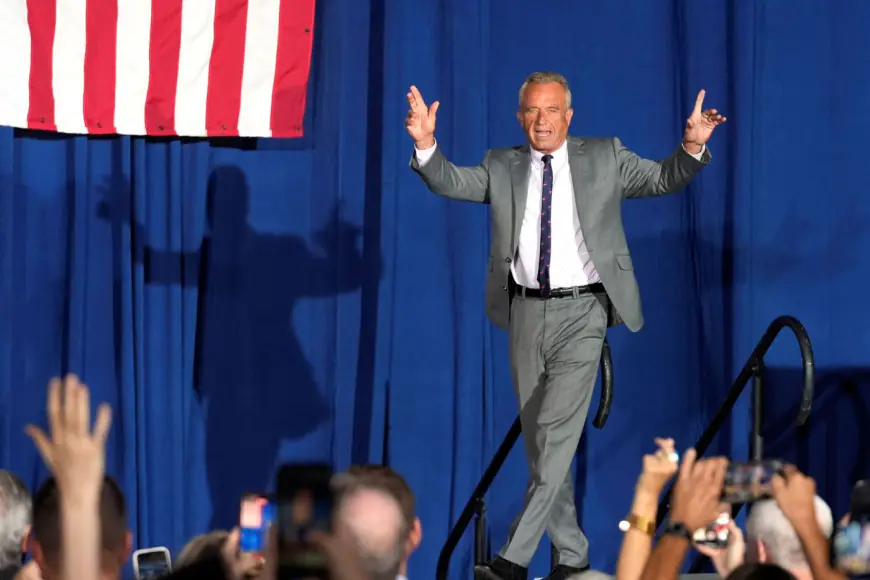Gaskin: RFK Jr. has big opportunity to make America healthier
The Food is Medicine movement supports Kennedy’s central focus on reversing the chronic disease epidemic, the leading cause of death in the U.S. and a driver of massive healthcare costs.

Robert Kennedy, President-elect Donald Trump’s choice for Secretary of Health and Human Services, has certainly made some eyebrow-raising comments in his criticisms of Big Food.
Presidents often reverse the prior administration’s actions, e.g., Joe Biden reversing Trump’s immigration and environmental policies and Trump’s plan to reverse Biden’s policies. Since the White House held its first Conference on Hunger, Nutrition, and Health two years ago, much progress has been made. Earlier this year, the Department of Health and Human Services hosted its first-ever “Food is Medicine” summit. Its objectives align with President Trump’s “Make America Healthy Again” agenda.
Will a Secretary Kennedy, who will oversee a $3.09 trillion budget for fiscal year 2024 (22.8% of the U.S. federal budget), build upon the Biden-Harris progress, pause it, or reverse it? One sign of hope is Kennedy’s team, which includes food policy advocates like Dr. Mark Hyman, founder of the Cleveland Clinic Center for Functional Medicine, and Dr. Casey Means, a Stanford-trained physician and entrepreneur.
Many of Kennedy’s criticisms of Big Food align with positions held for years by public health experts like Marion Nestle, a molecular biologist, nutritionist, and public health advocate. In her Food Politics newsletter, Nestle summarizes these positions as “calling for fixing the food system, doing something to coordinate and address diet-related chronic diseases, stopping corporate power, eliminating conflicts of interest between industry and government, getting toxic chemicals out of the food supply, and doing everything possible to refocus the food environment and dietary advice on health.”
The Food is Medicine (FIM) movement supports Kennedy’s central focus on reversing the chronic disease epidemic, the leading cause of death in the U.S. and a driver of massive healthcare costs. Among Kennedy’s proposals is banning food additives and artificial chemicals long prohibited in Europe. Ultra-processed foods, which make up about 73% of the U.S. food supply, are a significant target. Kennedy contends that such foods, particularly in school lunches and Supplemental Nutrition Assistance Program (SNAP) offerings, contribute to diet-related chronic diseases like obesity and diabetes. While there is some debate about how to define ultraprocessed foods and whether they are always harmful, Kennedy’s push to reduce them aligns with public health goals.
Kennedy’s criticism of weight-loss drugs like Ozempic also aligns with the FIM approach. Instead of treating symptoms of obesity, he emphasizes addressing systemic failures in the food system. His plans for mandatory nutrition education in federally funded medical schools would empower healthcare professionals to advocate for preventative dietary measures and use food as medicine.
Some of Kennedy’s ideas, however, are controversial. His promotion of raw milk, despite health risks, and his claims that seed oils are harmful contradict well-established research. Decades of study indicate that seed oils, rich in heart-healthy unsaturated fats, reduce risks of cardiovascular disease, Type 2 diabetes, and cancer. If Kennedy remains committed to evidence-based reform, his leadership could bring significant progress while avoiding these missteps.
Implementing reform will challenge the food industrial complex. Kennedy has argued for overhauling the FDA’s nutrition department and has suggested firing 600 employees at the National Institutes of Health. However, introducing new regulations in a pro-business, deregulatory political environment will be a difficult task.
By trying to reduce chronic disease via the food system, Kennedy will be also taking on Big Pharma, as many of their blockbuster drugs are for the chronic disease market. Trying to reduce additives in the food supply is another shot across the bow, and Kennedy is also targeting agricultural chemicals.
The Trump administration’s track record illustrates the challenges Kennedy could face. During its tenure, the EPA reversed a ban on chlorpyrifos, a pesticide linked to neurological problems in children, and approved over 100 toxic pesticides, many of which were banned in other countries. Additionally, Trump-era policies rolled back Barack Obama-era rules mandating more whole grains, fruits, and vegetables in school meals, effectively reversing efforts to make school lunches healthier.
Despite these challenges, Kennedy’s policy ideas could advance FIM goals. By focusing on systemic reforms, improving food quality, and addressing environmental impacts, Kennedy has the potential to become a transformative figure in food policy. Whether he builds upon recent progress or disrupts it depends on how effectively he translates his ideas into actionable policies.
Ed Gaskin is Executive Director of Greater Grove Hall Main Streets and founder of Sunday Celebrations.
What's Your Reaction?









































































































